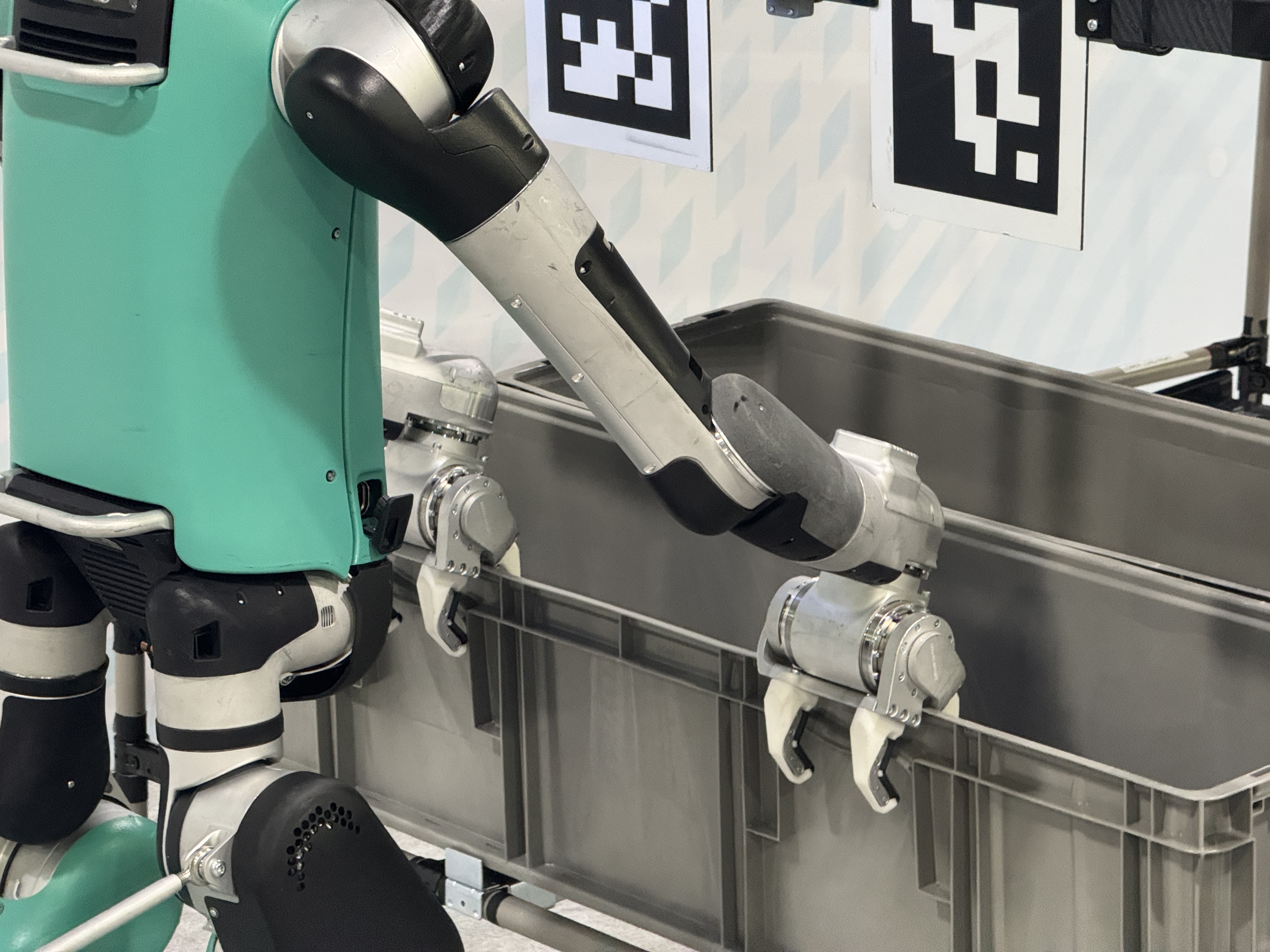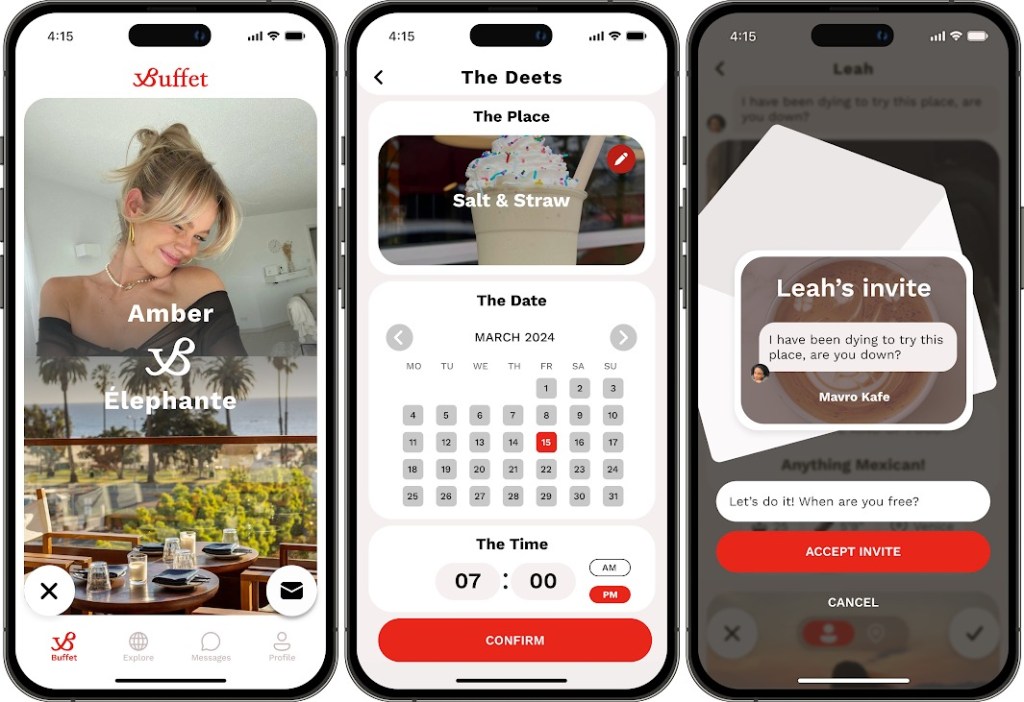
Perhaps a few years from now, the halls of the Georgia World Congress Center will be peppered with humanoid robots the week of Modex. In 2024, however, Digit stands alone at the supply chain show. It’s a testament to Agility’s healthy head start over competitors like Figure, Tesla, 1X and Apptronik. This time last year at Modex (the Chicago version of the conference), Digit had something of an industrial automation coming out party. A line of the bipedal robots were moving totes to a nearby conveyor belt at select times throughout the week.
This week in Atlanta, a rotating cast of eight Digits are working each day from show opening to close. This time, however, the blue and silver robots are doing something a bit different. The demos showcase lineside replenishment and tote retrieval with a flow rack designed for automotive manufacturing. Agility tells TechCrunch that it is currently working with automotive customers — though it has yet to release any names.
Famously, Ford was among Agility’s first proponents, announcing a partnership way back at CES 2020. Ultimately, plans to put Digit to work making last-mile deliveries fizzled, as the company instead pivoted focus to the nearer-term issue of warehouse staffing. That proved to be a canny move, as labor figures still have yet to return post-COVID. Former Agility CEO Damion Shelton told me last week that last-mile is still on the table, but there’s more than enough to focus on in the warehouse and manufacturing sectors to keep the company occupied.
Putting together a C-suite has been an important piece of the company’s growth over the past 12 months. Co-founders Shelton and Jonathan Hurst have shifted roles, from CEO and CTO to president and chief robotics officer, respectively. A week ago today, former Magic Leap CEO Peggy Johnson took the chief executive role over from Shelton. Last year, the company named Fetch founder and CEO Melonee Wise to the CTO role and brought former Apple and Ford executive Aindrea Campbell in as COO.
Agility Robotics’ new CEO is ‘focused on the here and now’
The leadership changes point to a company taking commercialization more seriously. They also put Agility in rare air among top robotics companies, with women in five of its nine C-suite roles.
Agility is ramping up production volumes, with plans to hit “high double-digit” production of its bipedal robot by end of year. This week at Modex, the company took the wraps off Agility Arc, deployment and fleet management software for Digit.
“The automation platform has all of the things you would expect from a fleet management system, in terms of battery, charging management, workflow management and robot tasking,” Wise tells TechCrunch. “But it also has the other aspects that you need for deploying and configuring a system and remotely monitoring and supporting the system. It’s a single pane of glass that allows you to basically do everything related to managing a fleet of Digits.”
Johnson, who previously helmed Magic Leap’s shaky pivot into enterprise, says the new enterprise software gave her confidence that her new company has surer footing than her last.
“The thing that was really encouraging when I learned about the new cloud automation system is that it’s such a sign of the maturation of the company,” she says. “This is not just a device, it’s something that’s meant to integrate. So often at [Johnson’s former employer] Microsoft, that would be the trip-up point. You would have some isolated system over here that wasn’t integrated with everything else and didn’t provide the value that it could. So, the fact that it will be able to integrate with WMS systems and other things the company is already using is a big weight off them.”

For Johnson, Modex has been a massive learning experience. She spoke to us last week from Japan, where she had recently competed in the Tokyo marathon. She hopped on a plane back to the States over the weekend specifically to get a first-hand view of the supply chain/logistics world of which she is now a part. “I wanted to make sure I was here to see not only the customers, but the environment the devices work in. I’m going to spend a lot of time walking around today and immerse myself in that.”
Johnson’s primary pitch as CEO is a quick path to ROI. That’s achievable in no small part to the fact that Digit is available through a RaaS (robotics-as-a-service) model, which has become an increasingly popular way to convince companies to take the leap. Customers can now pilot these systems without having to worry about massive upfront costs.
It’s those customers who ultimately shape Digit’s future. The model on the floor demonstrating an automotive workflow has a new pair of end effectors. Rather than the flipper-style appendages the company has been showcasing, this Digit has four digits of its own on each hand, with two pairs of hooked fingers facing in opposite directions. This isn’t dexterous mobile manipulation, however. Instead, it’s designed to do the thing that Digit has been doing all along: transporting totes.
The totes here are quite wide however (as is custom on the automotive line), prohibiting the robot from embracing it with an arm on each side. Instead the effectors grasp the front of the totes. This method also affords a more stable grip on a box that often has heavy, untethered objects rolling around inside.
In the not too distant future, Wise envisions a version of Digit that can swap out its end effectors as needed.
“When you look at the end effector specifically, there’s about 60 years of prior art,” she says. “All of [Modex], if you look around, all of these robot arms have different end effectors. That’s a very well understood thing. There’s something called ‘end of arm tooling.’ It’s swappable. What we’re going to be driving toward as a product is having swappable end of arm tooling and eventually make that an automated process.”
With what could be perceived as a dig at some of the humanoid robot competition, Shelton notes, “but interestingly, 0% of the solutions are five-fingered, 27-degrees of freedom hands.” He adds, “there have been some of our competitors who have been on the record saying that they are using a five-fingered hand basically as a branding exercise.”
As far as what the competition should be focused on, Wise believes Agility’s peers should center on safety — a huge concern when introducing new technologies into a warehouse setting. “We need to, collectively as an industry, get our safety story straight,” she says. “We as an industry need to come together and decide what the safety norms are.”
Johnson adds that companies need to focus on the task at hand. “Stay focused on the here and now and what can be done,” she says. “Everyone needs a roadmap, but stay focused and prove it out.”

